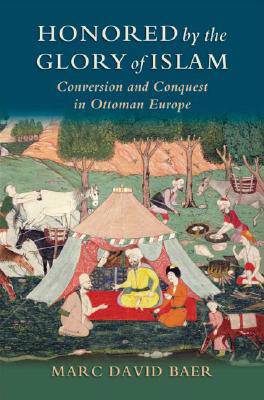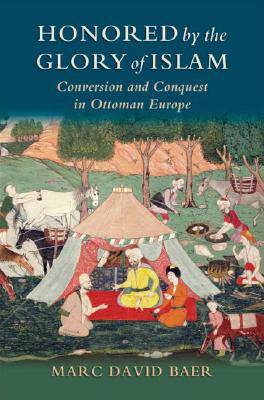
- Afhalen na 1 uur in een winkel met voorraad
- Gratis thuislevering in België vanaf € 30
- Ruim aanbod met 7 miljoen producten
- Afhalen na 1 uur in een winkel met voorraad
- Gratis thuislevering in België vanaf € 30
- Ruim aanbod met 7 miljoen producten
Zoeken
Honored by the Glory of Islam
Conversion and Conquest in Ottoman Europe
Marc David Baer
Hardcover | Engels
€ 177,45
+ 354 punten
Uitvoering
Omschrijving
In Honored by the Glory of Islam Marc David Baer proposes a novel approach to the historical record of Islamic conversions during the Ottoman age and gathers fresh insights concerning the nature of religious conversion itself. Rather than explaining Ottoman Islamization in terms of the converts' motives, Baer instead concentrates on the proselytizers -- in this case, none other than the sultan himself. Mehmed IV (1648-87) is remembered as an aloof ruler whose ineffectual governing led to the disastrous siege of Vienna. Through an integrated reading of previously unexamined Ottoman archival and literary texts, Baer reexamines Mehmed IV's failings as a ruler by underscoring the sultan's zeal for bringing converts to Islam. As an expression of his dedication to Islam, Mehmed actively sought to establish his reputation as a convert-maker, convincing or compelling Christian and Jewish subjects to be "honored by the glory of Islam" and Muslims subjects to turn to Islamic piety. Revising the conventional portrayal of a ruler so distracted by his passion for hunting that he neglected affairs of state, Baer shows that Mehmed IV saw conversion as central to his role as sultan. He traces an ever-widening range of enforced piety, conversion, and conquest expanding outward from the heart of Mehmed IV's empire. This account is the first to correlate the conversion of people and space in the mature Ottoman Empire, to investigate conversion from the perspective of changing Ottoman ideology, and to depict the sultan as an interventionist convert-maker. The resulting insights promise to rework our understandings of the reign of a forgotten ruler, a largely neglected period in Ottoman history, the changing nature of Islam and its history in Europe, relations between Muslims, Christians, and Jews in Europe, the practice of jihad, and religious architecture in urban history.
Specificaties
Betrokkenen
- Auteur(s):
- Uitgeverij:
Inhoud
- Aantal bladzijden:
- 344
- Taal:
- Engels
Eigenschappen
- Productcode (EAN):
- 9780195331752
- Verschijningsdatum:
- 2/01/2008
- Uitvoering:
- Hardcover
- Formaat:
- Genaaid
- Afmetingen:
- 156 mm x 234 mm
- Gewicht:
- 657 g

Alleen bij Standaard Boekhandel
+ 354 punten op je klantenkaart van Standaard Boekhandel
Beoordelingen
We publiceren alleen reviews die voldoen aan de voorwaarden voor reviews. Bekijk onze voorwaarden voor reviews.











